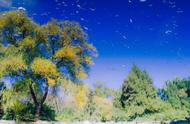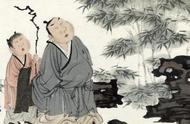南国之秋,当然是也有它的特异的地方的,比如廿四桥的明月,钱塘江的秋潮,普陀山的凉雾,荔枝湾的残荷等等,可是色彩不浓,回味不永。比起北国的秋来,正像是黄酒之于白干,稀饭之于馍馍,鲈鱼之于大蟹,黄犬之于骆驼。
Autumn in the South also has its unique features, such as the moonlit Ershisi Bridge in Yangzhou, the flowing sea tide at the Qiantangjiang River, the mist-shrouded Putuo Mountain and lotuses at the Lizhiwan Bay. But they all lack strong colour and lingering flavour. Southern autumn is to Northern autumn what yellow rice wine is to kaoliang wine, congee to steamed buns, perches to crabs, yellow dogs to camels.
秋天,这北国的秋天,若留得往的话,我愿把寿命的三分之二折去,换得一个三分之一的零头。
Autumn, I mean Northern autumn, if only it could be made to last forever! I would be more than willing to keep but one-third of my life-span and have two-thirds of it bartered for the prolonged stay of the season!
【注释】
《故都的秋》是郁达夫(1896-1945)的名篇,1934 年 8 月写于北平。文章通过对北国特有风物的细腻描绘,抒发作者对故都之秋的无比眷恋之情。
[1] “总是好的”不宜按字面直译。现译为 always has something to recommend itself,其中 to have…to recommend…作“有……可取之处”解。
[2] “不远千里,要从杭州赶上青岛……”译为 have made light of travelling a long distance from Hangzhou to Qingdao…,其中 to make light of 是成语,作“对……不在乎”解。
[3] “总看不饱,尝不透,赏玩不到十足”不宜逐字直译。译文 without ever relishing to my heart's content…中用 relishing to my heart's content 概括原文中的“看……饱”、“尝……透”、“赏玩……” 等。
[4] “每年到了秋天,总要想起陶然亭的芦花……”译为 the arrival of each autumn will put me in mind of Peiping's Tao Ran Ting with its reed catkins…,其中 to put one in mind of…是成语,作“使 人想起……”解。译文中的 Peiping's 是添加成分,以便国外读者理解句中所列各景点的所在地是 北平。
[5] “既觉得细腻,又觉得清闲”中的“清闲”意同“幽静”,故译为 quiet。
[6] “可和蟋蟀耗子一样,简直像是家家户户都养在家里的家虫”译为 seem to be living off every household like crickets or mice,其中 to live off (= to live on)中成语,作“靠……生活”解,用以表 达“养在……的家虫”。
[7] “更像样”意即“更有节制”,故译为 more temperate 。
[8] 根据上下文,“微叹“是为”感怀时光的消逝“,故以释义法译为 with a slight touch of reget at the passing of time。
[9] “西北风就要起来了”译为 the northwesterly wind will begin to reign supreme,其中 to reign supreme 强调“占优势”之意。
[10] “感到不能自已的深情”译为 have deep sentiments…in spite of themselves,其中 in spite of oneself 是成语,作“不由自主地”解。
[11] “秋士”是古汉语,指“士之暮年不遇者”,现译为 qiushi (autumn scholar, meaning an aged scholar grieving over frustrations in his life)。
[12] “欧阳子的秋声”即“欧阳修所作的《秋声赋》”,现译为 Ouyang Xiu’s On the Autumn Sough。
[13] 《赤壁赋》为苏东坡所作,借秋游赤壁,抒发自己的人生感慨。可译为 On the Red Cliff 或 Fu on the Red Cliff。














